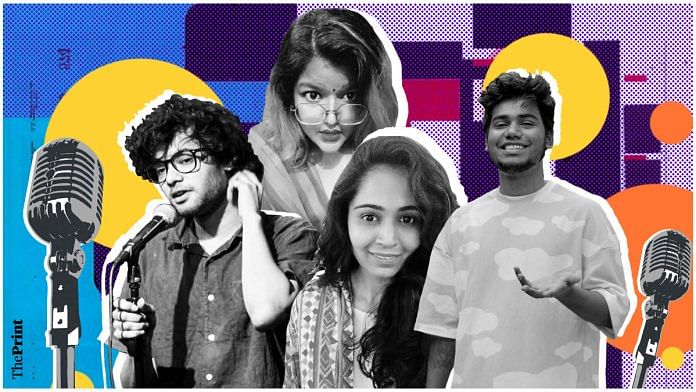Jokes about Tinder dating, break-ups, Uber drivers, Bangalore traffic woes and parental pressure to do engineering – Indian stand-up comedy has standard go-to sets. But most of the comics are ‘upper’ caste, urban and privileged. They routinely make fun of Mayawati, reservation, domestic workers, and villagers visiting city malls. But this lazy trope changes as soon as Dalit comedians take the mic.
“You all think I am a waiter, no?” Manjeet Sarkar, a 24-year-old Dalit comic from Chattisgarh’s Bastar, opens his set at Pluto’s Bar and Kitchen in Bengaluru with this line: “Hi, I’m Manjeet and I want to come out of the closet. I am a Dalit but identify as a Brahmin.” The venue roars with laughter and claps.
They are cracking the same light-hearted, self-deprecating jokes about everything from Indian parents to dating apps and engineering, but they are changing the punchline. Dalit comedians don’t punch down.
The jokes are for everyone
“It doesn’t matter whether it’s a queer lineup or a Dalit one. The jokes are for everyone. Our focus is to just make people laugh,” says Ankur Tangade, a 24-year-old Dalit comic who is also a theatre student from Beed, Maharashtra.
When a show claims it has an ‘All Dalit line-up’ doesn’t mean that the Guptas or Maliks don’t get an invite. The whole point of shows that feature Dalit comics is to reveal fun stories and have a good laugh, just like all other comics.
Manaal Patil, a 25-year-old advertising professional based in Hyderabad, began his stand-up journey in Mumbai. A comic on the side, he organised a show called ‘Blue Material’ with an all-Dalit line-up. “A lot of upper-caste people came to the show,” he says.
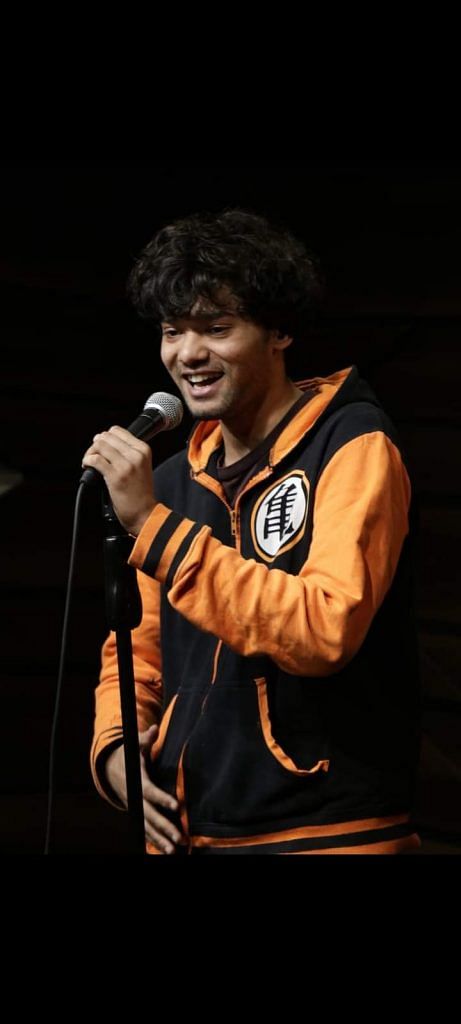
For someone who had been denied stage time by comics and producers under the pretext of ‘How long will you be stuck on caste?’, his content is not meant to prove a point to other castes, but is rather a slew of jokes about his own identity. In a clip from one of Patil’s shows that went viral on Twitter, he jokes about reservations being his ‘superpower’ and a college admission arriving quicker than a pizza order, with roars of laughter from his largely savarna audience.
This is how you crack quota joke @craziebawa pic.twitter.com/yzam4TRMHz
— manaal patil (@manaalpatil) May 19, 2021
Manjeet brings a completely different version of a Dalit Indian’s life to the table. Since he grew up in a Naxalite area, he jokes about everything from landmines to his Brahmin girlfriend not letting him be on top in bed because he’s a Dalit.
“I mostly talk a lot about the differences between city life and rural life. I come from a place where only 30 per cent of people are upper caste. But my focus is mainly on the tribal population in my region and our problems against the system,” he tells ThePrint.
“When people don’t laugh at my jokes, I touch them. After that, they have to bathe themselves in the Ganga. My superpower is untouchability,” Manjeet jokes at one of his shows. He makes a light-hearted reference to the time he was a child and berated for using a handpump in his village. A Brahmin woman cleaned the handpump with Gangajal to ‘purify’ it.
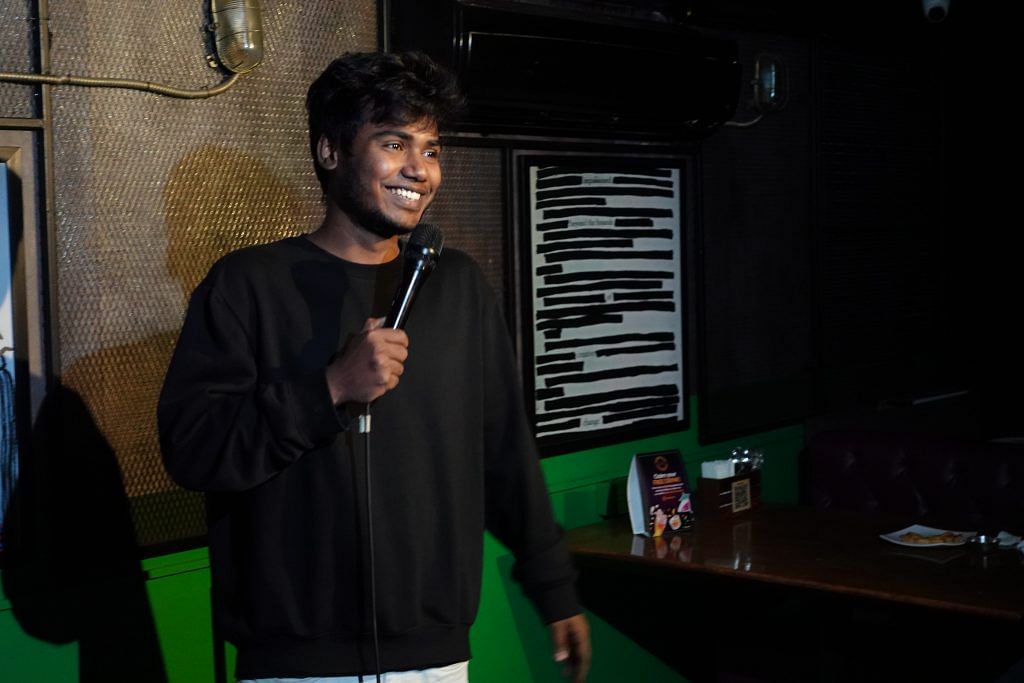
Bringing his stories to a metropolitan city like Bengaluru with a thriving comedy scene, Manjeet has been building quite the audience. “It feels good when people with Range Rovers come to my shows, laugh at my jokes and even invite me to their after-parties,” Manjeet says.
But Manjeet doesn’t want to play the victim. “I’m not looking to get sympathy laughs,” he says.
Neha Thombre, a YouTube sensation from a small village in Maharashtra and is now based in Nagpur, performs mainly in Marathi and recalls a satirical joke she used at one of her stand-up gigs in Nagpur this year. “A few days ago, when I was abroad, I was surprised that nobody there asked me my caste. I’m not used to this. So much equality? It was too much to handle, I felt like I was going to become unconscious.”
Also read: Pani puri, comedy & intolerance — Two days with Munawar Faruqui, the comedian denied a stage
Laughs and bias both
Getting laughs is one thing but the discrimination still goes on in India’s comedy scene.
Ankur Tangade gives us her take on what it is to be a queer, Dalit comic today. A daughter of social activists and an activist herself, she narrates the story of a production company that refused to hire Dalit comedians for its show.
“It was a very big company and we were 10-12 Dalit comedians working for them. Out of us, they chose one Brahmin for a project. At first, I did not think much of it until someone pointed it out to me that the company had a history of hiring just Brahmin artists,” Ankur says.
Ankur remains unafraid on stage. “Punching down means you can’t make fun of people who are vulnerable or less powerful. But I am Dalit, queer and a woman, I’m allowed to make fun of anyone. I’m a minority in the minority,” she says.
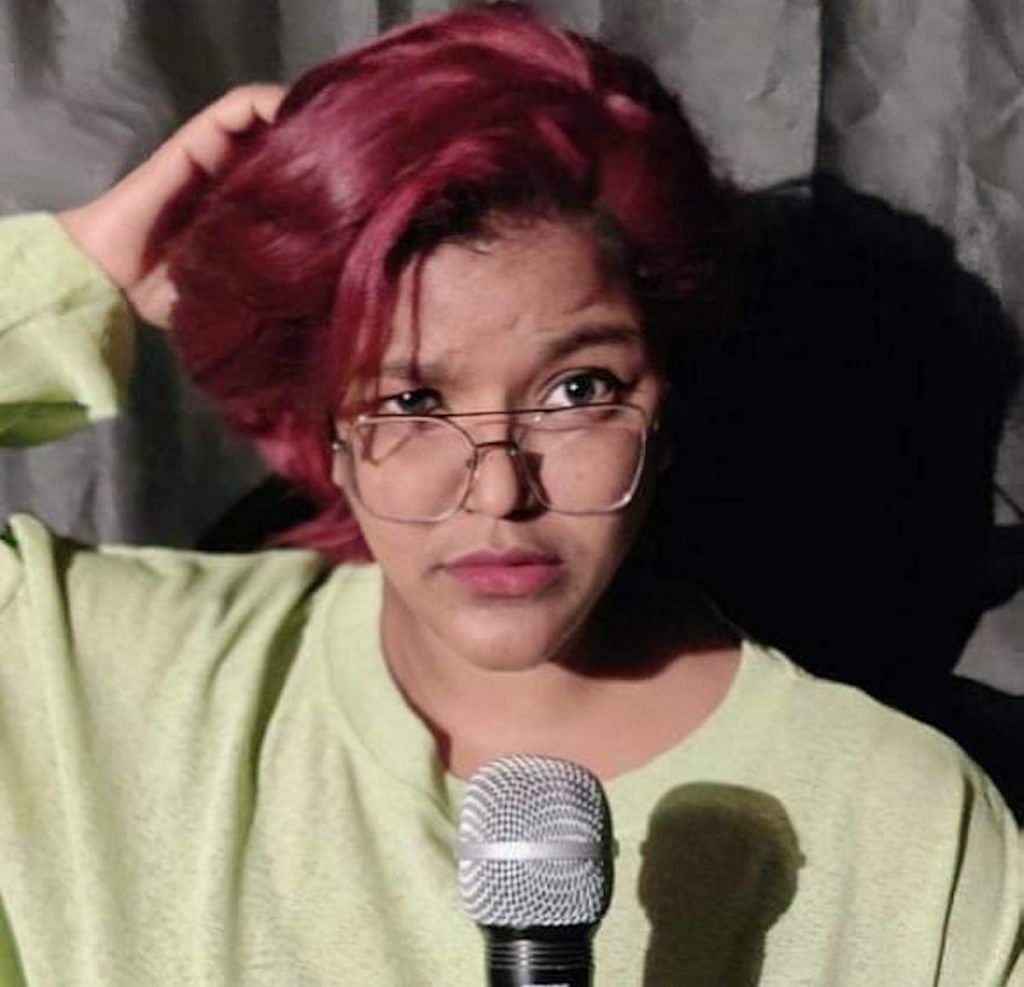
Manaal knows even if his show is a hit, he will face casteist comments. It happened to him at Boojee Café in Mumbai.
“The owner did laugh at my jokes, everyone did. But then he took a jibe at me and said I should be washing dishes after the show,” the comedian recalls.
The discrimination is not just at comedy clubs, though. Comedians form a tight-knit elite group in India. As a Dalit woman trying to make her mark in the industry, Neha often faced neglect when it came to mentorship. “It’s easier for upper caste people to get help in refining their sets and learning more,” she says.
Manjeet talks about the time when an audience member asked him: “You keep talking about Dalits constantly in your sets. But Dalits are becoming okay now, right?”
Audience members usually like and laugh at Manjeet’s jokes, but the occasional comment comes up every now and then.
“The upper caste comics in Bengaluru seem to carry a lot of Brahmin guilt, even my friends for that matter,” Manjeet observes.
Also read: Muslim comedians standing up against Islamophobia—one self-deprecating joke at a time
Politics of language
Neha, who calls her YouTube channel ‘a movement’, uses the power of her Marathi dialect ‘Varhadi’ to educate viewers. She calls her work “comedy along with social pinch.” She says that her language—Marathi—is the main reason she’s been able to climb the ladder of success.
“According to me, artists have no caste. And the viewers also don’t,” she says. “But I’ve had men reject me for marriage from my own community because they were not okay with me pursuing comedy.”
But the Marathi language has helped Neha create a niche of her own.
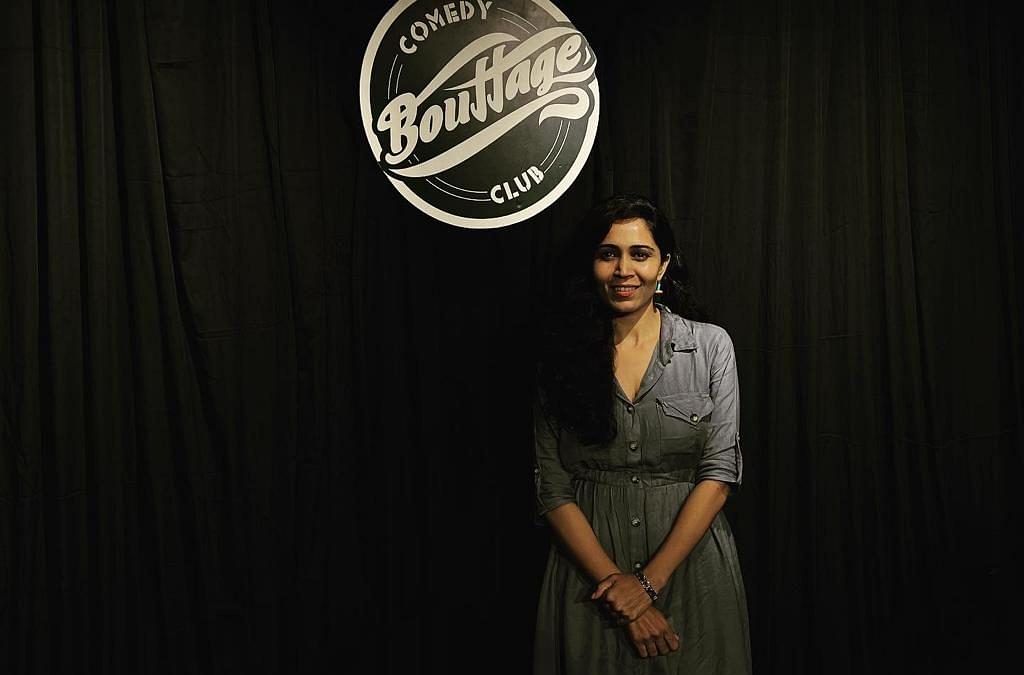
“Savarna bhasha or refined Hindi is considered to be a clean language. Regional languages like Bhojpuri are considered unclean. But using my own dialect has helped me strengthen my community. I just got a call from a Dalit family from Qatar telling me about how much they love my videos for that very reason,” she says.
Manjeet also recounts the time when he was in a green room before a show in Mumbai, back when he still did not know English very well. “Learning English for me happened after humiliation”, he jokes. He was discriminated against for not being able to speak the language. “I was served a demeaning look by the other comics and I remember those judgy eyes when I tried to make conversation with them. Upper caste or Brahmin thinking is not a caste-based issue anymore, but a social status or mentality. That tone has always stuck with me.”
With fame, tussles and travails, as these comics make sense of their identity as Dalits in India, they are also trying to crack jokes, just like anyone else.


